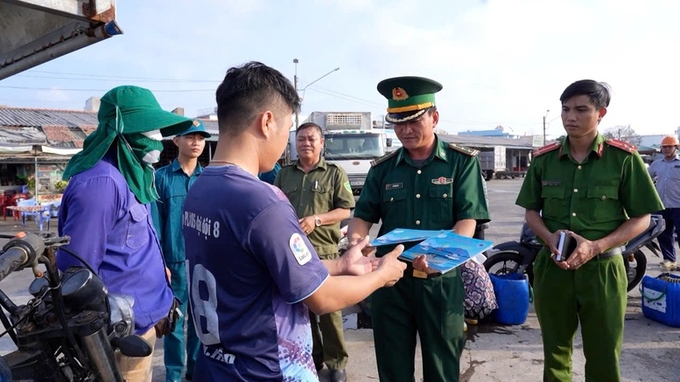May 23, 2025 | 13:26 GMT +7
May 23, 2025 | 13:26 GMT +7
Hotline: 0913.378.918
May 23, 2025 | 13:26 GMT +7
Hotline: 0913.378.918

The coordinated forces of Ba Ria - Vung Tau province propagated and mobilized fishermen to comply with regulations on aquatic exploitation.
With more than 33,000 fishing vessels, of which about 13,760 are fishing vessels with the largest length of 15 m or more operating in offshore areas, the current fleet in 10 southern provinces and cities, including: Kien Giang, Ca Mau, Bac Lieu, Soc Trang, Tra Vinh, Ben Tre, Tien Giang, Ba Ria - Vung Tau, Binh Thuan, Ho Chi Minh City - accounts for about 1/3 of the national fleet. Therefore, the fight against illegal, unreported, unregulated (IUU) fishing here is of great significance in the joint effort to remove the country's IUU "yellow card" warning.
On September 15, 2023, the Public Security of the ten aforementioned provinces and cities signed Coordination Plan No. 211, strengthening the fight against subjects who organize and broker for others to illegally enter and exit the country to exploit aquatic products in foreign waters.
After more than one year of signing and implementing Coordination Plan No. 211, up to now, the work of combating and handling violations and wrongdoings in the fisheries sector by the Public Security of 10 provinces and cities has achieved some positive results.
The police force has investigated and prosecuted 12 cases and 19 subjects violating regulations on combating IUU fishing. At the same time, it is continuing to urgently investigate and verify a series of other cases and incidents for prosecution and trial.
In addition, the application of Resolution No. 04 of the Supreme People's Court (SPC) Council of Judges on guiding the application of several provisions of the Penal Code on criminal prosecution for acts related to illegal exploitation, trading, and transportation of aquatic products has become one of the essential legal bases for competent authorities to investigate and clarify violations.
Colonel Tran Thi Kim Phung, Deputy Director of the Ba Ria - Vung Tau Provincial Police, said that Resolution No. 04 of the Supreme People's Court's Judicial Council has very specific instructions, thereby creating great convenience for handling violations related to IUU. Almost all acts of sending vessels to fish in foreign waters and disconnecting the journey can be criminally prosecuted.
From the above results, according to the assessment at the Conference to review one year of implementing the coordination plan, the situation of compliance with regulations on combating IUU fishing has changed positively, the management of fisheries and fleets has been strictly enforced, the majority of fishermen comply with regulations on combating IUU fishing.
However, the current work to combat IUU fishing still has limitations, many issues have not been thoroughly resolved, the situation of fishing vessels and fishermen violating and making mistakes in exploiting seafood at sea continues to occur.
At this conference, delegates focused on discussing and sharing experiences and good practices in implementing solutions to combat IUU fishing, controlling equipment to monitor fishing vessel journeys and aquatic product origins, applying Resolution No. 04 to investigate and handle crimes related to this activity and some recommendations and measures to overcome limitations in management, solutions to strengthen coordination between the police of provinces and cities in exchanging and verifying information, preventing violations from afar and early on.
The majority of opinions also agreed that there should be close coordination between the police force and departments, branches, sectors, and functional forces to strictly manage the number of fishing vessels and fishermen at high risk of violating the fight against IUU fishing and to propagate and raise people's awareness in many specific forms.
According to Pham Thi Na, Deputy Director of the Department of Agriculture and Rural Development of Ba Ria-Vung Tau province, coordination in state management of the fisheries sector needs to be carried out regularly and continuously. At the same time, as legal regulations are increasingly being improved, there needs to be close coordination between the two sides in handling violations. All information from state management agencies, including the agricultural sector, can help the police detect, investigate, and hold violations.
In fact, in recent times, the coordination between the provincial police and the provincial Department of Agriculture and Rural Development has been and is bringing about great results. Building on the results achieved after one year of implementing the Coordination Plan, in the coming time, the Public Security forces of 10 provinces and cities will continue further to promote preventive and deterrent solutions against IUU fishing violations, determined to work with the entire political system to achieve the goal of removing the EC's "yellow card" warning, for a sustainable and responsible fishery.
Translated by Huong Giang

(VAN) The mutual export of agrifood products between the European Union (EU) and the United Kingdom (UK) must occur again without certification, border controls or other red tape. This was agreed at the UK-EU summit.
/2025/05/22/5121-2-173645_677.jpg)
(VAN) NBSAP Tracker identifies strengths and areas for improvement in the National Biodiversity Strategy, based on each region’s priorities and capacities.

(VAN) The draft amendment to the Circular on rice export trading stipulates a periodic reporting regime for rice exporting enterprises.

(VAN) Dong Thap farmers attained an average profit margin of 64% during the summer-autumn 2024 crop (first season), while An Giang and Kien Giang farmers followed with 56% and 54%, respectively.

(VAN) As a doctoral student doing research on renewable energy and electrification at Harvard University, the author shares his musings on electricity, nature, and countryside memories.

(VAN) The decree on Extended Producer Responsibility (EPR) ensures transparent management and disbursement of support funds, avoiding the creation of a “give-and-take” mechanism.

(VAN) Hue City rigorously enforces regulations regarding marine fishing and resource exploitation, with a particular emphasis on the monitoring of fishing vessels to prevent illegal, unreported, and unregulated (IUU) fishing.